Archbishopric of Bari
|
Archdiocese of Bari-Bitonto Archidioecesis Barensis-Bituntinus |
|
|---|---|

Cathedral in Bari
|
|
| Location | |
| Country | |
| Ecclesiastical province | Bari-Bitonto |
| Statistics | |
| Area | 1,264 km2 (488 sq mi) |
| Population - Total - Catholics |
(as of 2015) 749,141 736,801 (98.4%) |
| Parishes | 126 |
| Information | |
| Denomination | Catholic Church |
| Rite | Roman Rite |
| Established | 4th Century |
| Cathedral | Cattedrale-Basilica di S. Maria |
| Co-cathedral | Concattedrale di Maria SS. Assunta |
| Secular priests | 196 (diocesan) 155 (Religious Orders) 76 Deacons |
| Current leadership | |
| Pope | Francis |
| Archbishop | Francesco Cacucci |
| Map | |
 |
|
| Website | |
| www.arcidiocesibaribitonto.it | |
The Roman Catholic Archdiocese of Bari-Bitonto (Latin: Archidioecesis Barensis-Bituntinus) is Metropolitan Latin rite archbishopric in the administrative Bari province, Puglia (Apulia) region, southeastern Italy (the 'Heel'), created in 1986, when the historical diocese of Bitonto was subsumed in the Archdiocese of Bari.
The first known bishop of Bari was said to have been Gervasius, or Gerontius, who, in 347, was present at the Council of Sardica. Gerontius, however, was actually from the city of Beroea in Macedonia, and there is no record of Gervasius, or of Bari, at the Council of Sardica.
In 530 bishop Peter is said to have held the title of Metropolitan under Epiphanius, bishop of Constantinople & Ecumenical Patriarch. This too is a fantasy. In the 6th century the bishops of Apulia were directly subject to the Roman pontiff. It was not until after the Byzantine Patriarchs regained their control of Calabria and Apulia after the decree of Leo I that Bari became an archbishopric, and that situation changed when the Normans invaded Calabria and Apulia in the 11th century and returned the Churches of Calabria and Apulia to the Roman obedience.
In 780 bishop Leontius was present at the Second Council of Nicaea.
In the ninth century the Saracens laid waste Apulia, destroyed the city of Canosa (Canusium) and captured Bari. In 841, however, the Byzantine army reconquered Bari, and in 844 Bishop Angelarius, Bishop of Canosa, brought to Bari the relics of Rufinus, Memorus, and Sabinus of Canosa, which he had rescued from the ruins of Canosa. Pope Sergius II conferred on Angelarius the title of Bishop of the two dioceses of Bari and Canosa, a title which the archbishops of Bari retained up to 1986. In 988 the Saracens descended upon Bari, depopulated the countryside and took men and women to Sicily as captives. In 991 Count Atto fought against the Saracens at Taranto, where he and many men of Bari fell. In 1002 Bari was besieged from 2 May until October, when they were rescued by Pietro Orseolo (II), the Doge of Venice.
...
Wikipedia
